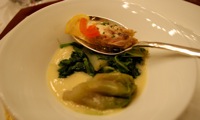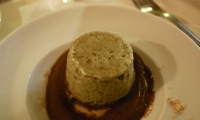Seasonal foods. Local produce. Respecting the integrity of fresh ingredients. All are keystones of modern culinary thought. But so too are they hallmarks of Pugliese cuisine—where simple, local food has long been a matter of necessity rather than choice.
A historically poor region of Italy, Puglia's culinary tradition is dominated by la cucina povera—a peasant’s cuisine, heavily reliant on vegetables, grains, and legumes. And many of the region’s hallmark dishes employ just a few readily available ingredients, their preparation honed through the repetition of millennia.
Chief among these is the nearly ubiquitous fave e cicoria, or ‘ncapriata, a pureé of cooked fava beans served with boiled chicory and drizzled, as everything, with spicy Puglian olive oil. Records of similar dishes date back as far as the Romans; in fact, famed historian Pliny refers to a fava-based soup called “puls fabata.” Such simple preparations, nutrient-rich and made from hardy staples, anchored the diets of many Southern Italians throughout centuries of hard times.


Despite its plebeian roots, however,
fave e cicoria remains a popular Pugliese dish on restaurant menus just as on the family table. Many chefs stray little from the orthodox preparation, adding nothing more than a bit of sautéed onion or a grind of fresh pepper. Others, however, have fashioned decidedly more elevated versions. At
ReMare, an acclaimed seafood restaurant in Mola di Bari, the chef pairs a starter of
fave e cicoria with a spoon of monkfish in oil and lemon, weaving the region's fresh seafood into its most traditional dish. And Chef Ottavio Surico, at Osteria del Borgo Antico in the town of Gioia del Colle, reinvents the combination altogther—placing a
budino of the similarly bitter wild thistle
cardi selvatici on a puree of
ceci neri, Puglia’s dark, hearty chickpeas. Laying a perfectly set custard atop a carefully seasoned
crema hardly recalls the pastoral kitchen. But those ancient flavors—bitter greens, earthy legumes, and sharp, fruity olive oil—remain very much the same.